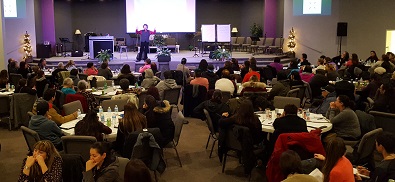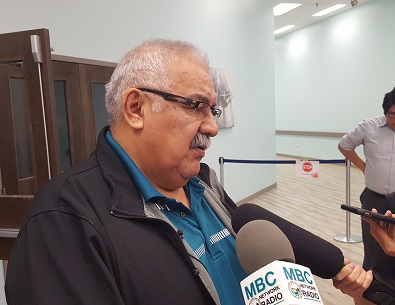PAGC Grand Chief Ron Michel. Photo by Chelsea Lakowski
The main speaker at a much-anticipated medicine gathering on First Nations suicides has a unique approach to the issue.
This week, BC psychologist Darien Thira is speaking to hundreds of First Nations people from all over the province who are gathered in Prince Albert for a community-based suicide prevention gathering called “The Community is the Medicine.”
The gathering comes during a season where the suicides of northern Saskatchewan females between the ages of 10 and 14 made headlines across Canada. Prince Albert Grand Council Grand Chief Ron Michel says First Nations need to take the reins of improving the lives of its people, but also need help from other governments.
Thira works as a consultant with Indigenous communities who have eliminated suicide.
“We so often hear people say ‘there is a mental health crisis in Aboriginal communities.’ There is no mental health crisis in Aboriginal communities. What there is are the terrible impacts of colonization. So when we’re doing suicide prevention work what we’re really doing cleansing the wound of colonization within a community to drive suicide out,” Thira said.
A number of PAGC’s leaders addressed the impacts of colonization in their opening speeches. One of those was the loss of self-governance.
“We can no longer depend on a bureaucracy that has put us into this situation. We have to start looking after ourselves,” said Michel.
He said developments in First Nations programming sometimes get tied up by bureaucracy, but “we cannot give up. We have to take over control of our First Nations and our communities, and our lives.”
Michel said the 1980s and 1990s saw a rapid movement of drugs and alcohol into the north. Dealers and bootleggers target vulnerable young people and families, which leads to neglect, he said.
Dene Vice-Chief Joseph Tsannie touched on the familial violence and alcoholism he witnessed growing up, saying his situation was not different from many who commit suicide.
In Thira’s view, the key to ending suicide, drug abuse, alcohol misuse, and violence is the same: find a contemporary way to bring traditional values and culture back into First Nations communities.

Thira speaks at the gathering. Photo by Chelsea Laskowski
While many leaders in northern Saskatchewan have been pleading for long term federal support for more mental health professionals, MBC has heard a number of community concerns that “outside” help, such as flown-in mental health professionals, are not a solution to suicides.
Thiera said there is a place for this type of help, but it is temporary and meant to last a few days or weeks.
“Sometimes outside folks are needed because everybody is so impacted by the crisis that they’re not able to reach out and support those who are in immediate need and at that moment clinical or counselling response,” he said.
Once everyone is safe, suicide prevention is the job of those in the community, Thira said. As a non-aboriginal person, he said it’s his job to ask questions to find their own cultural-based solutions.
During his afternoon session, he guided discussion on the need for meaningful, healthy roles for all community members in order to have a “well lived life” that acts as an antidote to colonization.
Also in attendance on Monday, was new Children and Youth advocate Corey O’Soup, reminding attendees that he’s in the process of preparing a report on northern suicides. He said he plans to hand that report to both the province and the federal government.
The gathering continues on Tuesday. Frontline First Nations education and health workers, as well as young adults, will discuss ideas that work in their communities.
